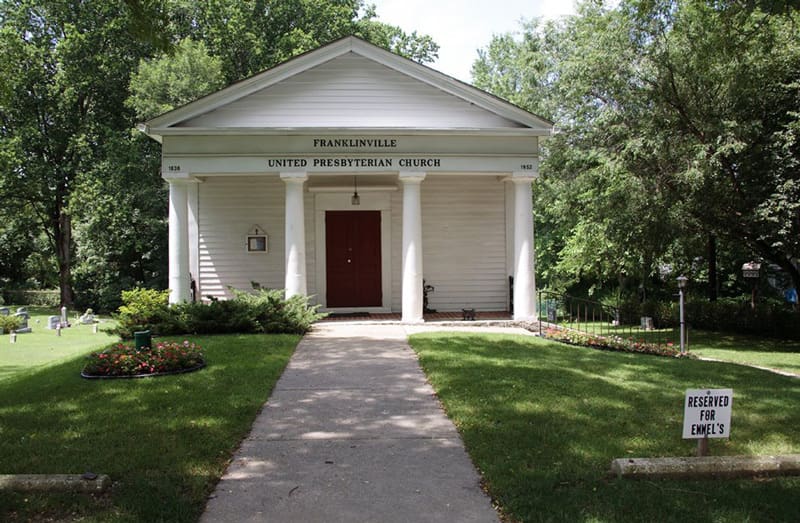Our Faith
At Franklinville Presbyterian Church we belong to the Presbyterian Church (USA) and enjoy a traditional style of Worship. The word “Presbyterian” is used in the name of several denominations and even in the names of individual, independent churches. The Presbyterian Church (USA) is the largest, often called main-stream, Presbyterian denomination in the United States. It has the reputation of being progressive and inclusive in its approach to the world and scholarly in its approach to theology. We welcome as members of our congregation both members of the PC(USA) and those who are not, whether churched (members of another church) unchurched, or unbaptized. Women are respected and encouraged to serve as elected officers of the congregation and as Ministers of the Word and Sacrament.
The foundations of our theology are found in the Book of Confessions which is part of the Constitution of the Presbyterian Church (USA). It contains twelve creeds and confessions of faith that begin with the Nicene Creed and the Apostle’s Creed, both fundamental to all Christianity, and then include more recent creeds adopted by the Presbyterian Church since it arose in the reformation up the most recent adopted since 2010. Adopting a new confession is a six-year long process involving prayerful deliberation by three General Assembly conventions of debate and deliberation informed by scripture and study. Once adopted they are published for all congregations to study and digest. In this way our theology is “Reformed, and always reforming”.
Sacraments
The Presbyterian Church celebrates the Sacraments of the Lord’s Supper (Holy Communion) and Baptism. Our congregation observes the Sacrament of the Lord’s Supper during Worship on the first Sunday of each month and certain special occasions such as Ash Wednesday and Easter when it falls on a Sunday.
Brief Presbyterian History
The Presbyterian Church (USA) is the largest Presbyterian denomination in the United States and the direct descendant of the colonial Presbyterian Church in Philadelphia upon which the representative democracy form of our national government was patterned. The denomination formed very early in the Protestant Reformation and took its name from the Greek word presbyteros in the New Testament of the Bible. It means Elder and refers to the structure of early congregations (at the time of the apostles before there were any ministers or a denominational structure) that chose their own leaders and called them Elders (presbyteros). The Presbyterian Church became the National Church of Scotland and sprung from the Dutch Reformed movement. We like to say “We are Reformed, and always reforming.” It is a church actively seeking to divine what God is calling us to in our time and place, informed by Scripture, prayer and meditation, and corporate deliberation. Every two years, elected representatives from all over the United States meet to consider proposals to update our Constitution that establishes our practices and theology.

Style of Worship
Our Worship service follows traditional order:
- Call to Worship
- Praise
- Confession
- Scripture Readings
- Reflection on the Scripture (sermon)
- Statement of Creed
- Stewardship
- Corporate Prayer of Intercession and the Lord’s Prayer
- Charge and Benediction.
The Scripture readings follow the standard lectionary adopted by many denominations, a three-year cycle through the three synoptic Gospels (Matthew, Mark, Luke) one each year, and then repeat. Readings from the gospel of John are interspersed during the three years. Hymns are sung and music is provided by organists. On the first Sunday of each month, we include celebrating the sacrament of the Lord’s Supper and on the third Sunday of each month we include a liturgy for Wholeness and Healing. We provide outreach to shut-ins and support to local, national, and world caring ministries.
Governance
The Presbyterian Church is not ruled by a hierarchy of clergy – there are no priests, or bishops, nor a counterpart for a pope. The Presbyterian Church instead is governed according to a Constitution, a living document established and amended by a representative democracy. The denomination governance is bottom-up with authority resting with the individual members of the congregations who annually elect Ruling Elders from among their membership who meet in a council called the Session that makes decisions by vote to manage their church. The ministry is conducted by ordained Ministers of the Word and Sacrament called Teaching Elders and one of them chairs the Session but has no vote except in the case of a tie. The Teaching Elders do not run their church, instead they are hired (and fired) by the congregation and serve the congregation through spiritual leadership and education. They are trained by at least four years of a college-level Seminary degree program and examined by a Presbytery which is a council of elected Ruling Elders (lay persons) and Teaching Elders representing all the churches of a geographical area. Ours is the Presbytery of Baltimore which is the middle level governing body for 72 churches in central and western Maryland. The Presbyteries in turn elect representatives to the national ruling body, the General Assembly. In both of these councils the Constitution requires there to be an equal number of Ruling Elders (lay persons) and Teaching Elders (clergy) voting.
